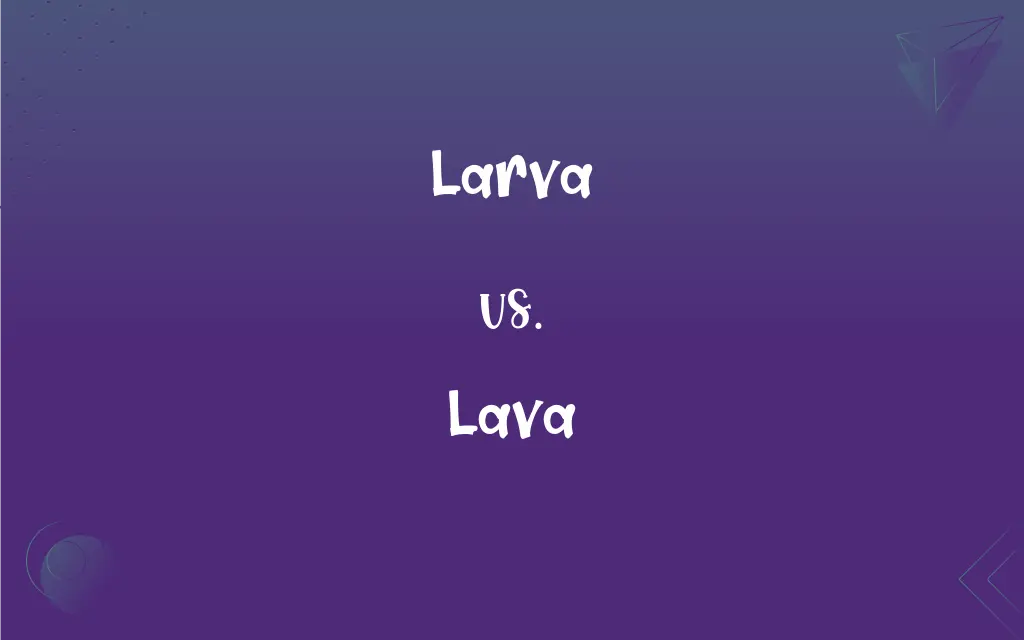Larva vs. Lava: What's the Difference?
Edited by Harlon Moss || By Janet White || Updated on October 5, 2023
Larva is an immature stage in the life cycle of many animals, while lava is molten rock expelled by a volcano. They are different in meaning, context, and usage.

Key Differences
Larva represents an early stage in the life cycle of many animals, especially insects, undergoing metamorphosis. This stage is distinct from the adult stage in appearance, structure, and often habitat. Lava, on the other hand, refers to the molten rock that flows from a volcano during an eruption. This substance can form different types of volcanic rocks once it cools and solidifies. Larva and lava are two terms with entirely different definitions and contexts—one biological and the other geological.
The concept of larva is crucial in the study of entomology, the branch of zoology concerned with the study of insects. It helps scientists understand the developmental stages, behaviors, and adaptations of various species. In contrast, lava is vital in the field of geology, aiding in understanding volcanic activities, earth's composition, and the formation of the earth’s crust. The words larva and lava, though similar in spelling, pertain to different scientific fields and studies.
In many species, a larva is specifically adapted to a particular environment or mode of life that is different from that of the adults. For example, a caterpillar—the larva of a butterfly—has a different form, structure, and feeding habit compared to the adult butterfly. Conversely, lava, once expelled from a volcano, can have significant impacts on the environment, creating new landforms and affecting ecosystems. The differences between larva and lava extend to their effects and interactions with their surroundings.
Larva and lava may sound somewhat similar phonetically, but their meanings, applications, and implications are vastly disparate. A larva is a developmental stage in animals, serving as a transition phase before they reach maturity. Lava is the hot fluid or semi-fluid material below the earth's crust, which is thrown out by a volcano. They are unequivocally distinct terms that are used in entirely different scientific contexts and disciplines.
Comparison Chart
Definition
An immature form of an animal.
Molten rock expelled by a volcano.
ADVERTISEMENT
Field of Study
Zoology
Geology
Formation
Develops from the egg of many animals.
Formed from the partial melting of the earth’s mantle.
Impact
Undergoes metamorphosis to become an adult.
Creates new landforms and affects ecosystems.
Composition
Biological entity.
Mixture of molten or semi-molten rock.
Larva and Lava Definitions
Larva
A young, immature form of an animal that undergoes metamorphosis.
The frog larva, or tadpole, has gills and lives in water.
ADVERTISEMENT
Lava
The liquid rock expelled by a volcano during an eruption.
The island was formed millions of years ago by cooling lava.
Larva
An animal in an early stage of development that differs markedly from the adult.
The mosquito larva lives in water before metamorphosing into an adult.
Lava
Molten rock that reaches the earth's surface through a volcano.
The lava flowed down the mountain, destroying everything in its path.
Larva
The immature, wingless, feeding stage of an insect.
The larva of the butterfly is known as a caterpillar.
Lava
Molten rock that reaches the earth's surface through a volcano or fissure.
Larva
The juvenile form of many animals, typically resembling a worm.
The fish larva is transparent and free-swimming.
Lava
The rock formed by the cooling and solidifying of molten rock.
Larva
The newly hatched, wingless, often wormlike form of many insects, developing into a pupa in species that undergo complete metamorphosis.
Lava
The molten rock ejected by a volcano from its crater or fissured sides.
Larva
The six-legged immature form of a tick or mite.
Lava
Magma.
Larva
The newly hatched, earliest form of any of various animals that undergo metamorphosis, differing markedly in appearance from the adult.
Lava
A shade of red, named after the volcanic lava.
Larva
Roman Mythology A malevolent spirit of the dead.
Lava
The melted rock ejected by a volcano from its top or fissured sides. It flows out in streams sometimes miles in length. It also issues from fissures in the earth's surface, and forms beds covering many square miles, as in the Northwestern United States.
Larva
An early stage of growth for some insects and amphibians, in which after hatching from their egg, insects are wingless and resemble a caterpillar or grub, and amphibians lack limbs and resemble fish.
Lava
Rock that in its molten form (as magma) issues from volcanos; lava is what magma is called when it reaches the surface
Larva
An animal in the aforementioned stage.
Lava
A high-temperature mixture of molten substances from the earth’s mantle.
Lava can reach temperatures of more than 1,200 degrees Celsius.
Larva
A form of a recently born or hatched animal that is quite different from its adult stage.
Lava
Solidified rock formed from cooled molten lava.
The hikers walked over the rough terrain of the cooled lava.
Larva
(figurative) A preliminary stage of someone or something, before it has fully matured, especially a time of growth rather than one of performance.
Lava
The material that forms the crust of the earth after being expelled as molten rock.
The lava cooled and solidified into a new landform.
Larva
Any young insect from the time that it hatches from the egg until it becomes a pupa, or chrysalis. During this time it usually molts several times, and may change its form or color each time. The larvæ of many insects are much like the adults in form and habits, but have no trace of wings, the rudimentary wings appearing only in the pupa stage. In other groups of insects the larvæ are totally unlike the parents in structure and habits, and are called caterpillars, grubs, maggots, etc.
Larva
The early, immature form of any animal when more or less of a metamorphosis takes place, before the assumption of the mature shape.
Larva
The immature free-living form of most invertebrates and amphibians and fish which at hatching from the egg is fundamentally unlike its parent and must metamorphose
Larva
A developmental stage of animals, between egg and pupa or between egg and maturity in insects.
The larva of the beetle is often called a grub.
FAQs
Can lava form new landforms?
Yes, lava can create new landforms when it cools and solidifies.
Is the study of larva related to zoology?
Yes, the study of larva is related to zoology, especially entomology.
Is a larva an immature form of an animal?
Yes, a larva is an immature form of many animals, especially insects.
Does a larva undergo metamorphosis?
Yes, a larva undergoes metamorphosis to reach its adult form in many species.
Do all animals have a larval stage?
No, not all animals have a larval stage; it is common in insects, fish, and amphibians.
Is the study of lava related to geology?
Yes, the study of lava is a significant aspect of geology.
Is lava molten rock from a volcano?
Yes, lava is molten or semi-molten rock expelled by a volcano.
Is lava hot?
Yes, lava is extremely hot, reaching temperatures over 1,200 degrees Celsius.
Can a larva be aquatic?
Yes, many larva, such as mosquito larvae, are aquatic.
Can lava destroy everything in its path?
Yes, lava can destroy buildings, vegetation, and anything else in its path.
Does the appearance of a larva differ from the adult form?
Yes, the larva usually has a different appearance and structure compared to the adult form.
Does lava come from the earth’s mantle?
Yes, lava is formed from the partial melting of the earth’s mantle.
Is the term larva used only for insects?
No, the term larva is used for the immature stage of various animals, not just insects.
Can lava create islands?
Yes, lava can create islands when it solidifies in the ocean.
Is a caterpillar a larva?
Yes, a caterpillar is the larval stage of butterflies and moths.
About Author
Written by
Janet WhiteJanet White has been an esteemed writer and blogger for Difference Wiki. Holding a Master's degree in Science and Medical Journalism from the prestigious Boston University, she has consistently demonstrated her expertise and passion for her field. When she's not immersed in her work, Janet relishes her time exercising, delving into a good book, and cherishing moments with friends and family.
Edited by
Harlon MossHarlon is a seasoned quality moderator and accomplished content writer for Difference Wiki. An alumnus of the prestigious University of California, he earned his degree in Computer Science. Leveraging his academic background, Harlon brings a meticulous and informed perspective to his work, ensuring content accuracy and excellence.































































